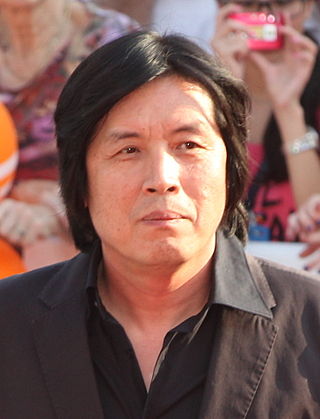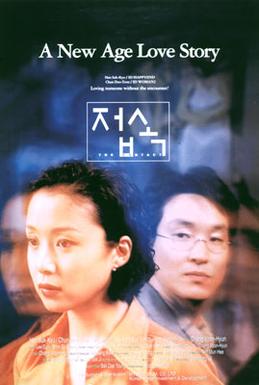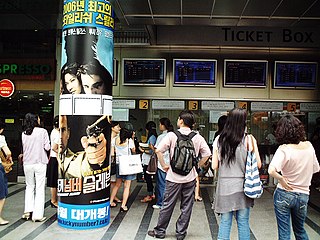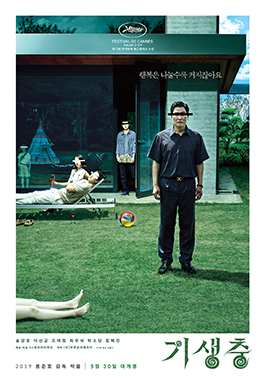| Lists of South Korean films by year |
|---|
 |
| Korean Animation |
A list of films produced in South Korea in 1997:
| Lists of South Korean films by year |
|---|
 |
| Korean Animation |
A list of films produced in South Korea in 1997:

South Korea, officially the Republic of Korea (ROK), is a country in East Asia. It constitutes the southern part of the Korean Peninsula and borders North Korea along the Korean Demilitarized Zone; though it also claims the land border with China and Russia. The country's western border is formed by the Yellow Sea, while its eastern border is defined by the Sea of Japan. South Korea claims to be the sole legitimate government of the entire peninsula and adjacent islands. It has a population of 51.96 million, of which roughly half live in the Seoul Capital Area, the ninth most populous metropolitan area in the world. Other major cities include Busan, Daegu and Incheon.
The year 1997 in film involved many significant films, including Titanic, The Full Monty, Gattaca, Donnie Brasco, Good Will Hunting, L.A. Confidential, The Fifth Element, Nil by Mouth, The Spanish Prisoner, and the beginning of the film studio DreamWorks.

Lee Chang-dong is a South Korean film director, screenwriter, and novelist. He has directed six feature films: Green Fish (1997), Peppermint Candy (1999), Oasis (2002), Secret Sunshine (2007), Poetry (2010), and Burning (2018). Burning became the first Korean film to make it to the 91st Academy Awards' final nine-film shortlist for Best Foreign Language Film. Burning also won the Fipresci International Critics' Prize at the 71st Cannes Film Festival, Best Foreign Language Film in Los Angeles Film Critics Association, and Best Foreign Language Film in Toronto Film Critics Association.

The national flag of the Republic of Korea, also known as the Taegeukgi, has three parts: a white rectangular background, a red and blue taegeuk in its center, accompanied by four black trigrams, one in each corner. Flags similar to the current Taegeukgi were used as the national flag of Korea by the Joseon dynasty, the Korean Empire, as well as the Korean government-in-exile during Japanese rule. South Korea adopted the Taegeukgi for its national flag when it gained independence from Japan on 15 August 1945.

The term "Cinema of Korea" encompasses the motion picture industries of North and South Korea. As with all aspects of Korean life during the past century, the film industry has often been at the mercy of political events, from the late Joseon dynasty to the Korean War to domestic governmental interference. While both countries have relatively robust film industries today, only South Korean films have achieved wide international acclaim. North Korean films tend to portray their communist or revolutionary themes.

The Korean Wave or Hallyu is a cultural phenomenon in which the global popularity of South Korean popular culture has dramatically risen since the 1990s. Worldwide interest in Korean culture has been led primarily by the spread of K-pop and K-dramas, with keystone successes including BTS and Psy's "Gangnam Style", as well as Jewel in the Palace, Winter Sonata, Boys Over Flowers (2009) and Squid Game. The Korean Wave has been recognized as a form of soft power and as an important economic asset for South Korea, generating revenue through both exports and tourism.

Hong Sang-soo is a South Korean film director and screenwriter. An acclaimed and prolific filmmaker, Hong is known for his slow-paced films about love affairs and everyday dilemmas in contemporary South Korea.

Arirang TV (Arirang International Broadcasting) (Korean: 아리랑 국제방송) is a South Korean-based broadcasting company operated by the International Broadcasting Foundation. It provides English information on current events, culture, and history of Korea to the surrounding areas of Korea. Arirang TV (Arirang International Broadcasting) is named after the Korean traditional folk song “Arirang.”

The Contact is a 1997 South Korean romance film directed by Chang Yoon-hyun. Starring Han Suk-kyu and Jeon Do-yeon, it was the second biggest-grossing Korean film of 1997 with 674,933 admissions, and was awarded the Grand Bell Awards for best picture.

South Korean films have been heavily influenced by such events and forces as the Korea under Japanese rule, the Korean War, government censorship, the business sector, globalization, and the democratization of South Korea.
Korean horror films have been around since the early years of Korean cinema, however, it was not until the late 1990s that the genre began to experience a renewal. Many of the Korean horror films tend to focus on the suffering and the anguish of characters rather than focus on the explicit "blood and guts" aspect of horror. Korean horror features many of the same motifs, themes, and imagery as Japanese horror.

Jung is a Latin alphabet rendition of the Korean family name "정", also often spelled Jeong, Chung, Joung or Jong. As of the South Korean census of 2015, there were 2,407,601 people by this name in South Korea or 4.84% of the population. The Korean family name "정" is mainly derived from three homophonous hanja. 鄭 (2,151,879), 丁 (243,803) and 程 (11,683). The rest of the homophonous hanjas include: 政 (139), 桯 (41), 定 (29), 正 (22) and 情 (5).
This is a list of films by year produced in the country of South Korea which came into existence officially in September 1948. The lists of Korean films are divided by period for political reasons. For earlier films of united Korea see List of Korean films of 1919–1948. For the films of North Korea see List of North Korean films. For an A-Z list of films see Category:Korean films.

The Bucheon International Fantastic Film Festival, or BiFan, formerly known as Puchon International Fantastic Film Festival or PiFan, is an international film festival held annually in July in Bucheon, South Korea. Inaugurated in 1997, the festival focuses on South Korean and international horror, thriller, mystery and fantasy films, with particular attention to Asian cinema from East Asia and Southeast Asia. It is a non-competitive international film festival, with partial competition, awarding a number of awards.

Choi Jin-sil was a South Korean actress. She was considered one of the greatest actresses in South Korea, nicknamed "The Nation's Actress" for playing leading roles in some of the highest-rated Korean dramas of all time such as Jealousy (1992), Season of Storms (1993), Star in My Heart (1997), You and I (1997) and My Rosy Life (2005). Her film work includes North Korea's Southern Army (1990), My Love, My Bride (1990), Susanne Brink's Arirang (1991) and The Letter (1997). Widely regarded as the most popular actress of her time, she led the entertainment industry in terms of commercial success across film, television, and advertising. She played leading roles in 18 films and 20 television dramas, appeared in hundreds of advertisements, and won several awards. She was 39 when she died by suicide by hanging on October 2, 2008, at her home in Seoul.
The Baeksang Arts Awards, also known as the Paeksang Arts Awards, are awards for excellence in film, television and theatre in South Korea. The awards were introduced in 1965 by Chang Key-young, the founder of the newspaper Hankook Ilbo, whose art name was "Baeksang". It was established for the development of Korean popular culture and art and for enhancing the morale of artists. They are regarded as one of the most prestigious entertainment awards in South Korea.
CJ Entertainment is a South Korean film production and distribution company under CJ ENM Entertainment Division. The company operates as a film production company, film publishing house, investment and exhibition.
The Korean Film Council is a state-supported, self-administered organization under the Ministry of Culture, Sports and Tourism (MCST) of the Republic of Korea.

Parasite is a 2019 South Korean dark comedy thriller film directed by Bong Joon-ho, who co-wrote the screenplay with Han Jin-won and co-produced. The film, starring Song Kang-ho, Lee Sun-kyun, Cho Yeo-jeong, Choi Woo-shik, Park So-dam, Jang Hye-jin, Park Myung-hoon, and Lee Jung-eun, follows a poor family who infiltrate the life of a wealthy family.